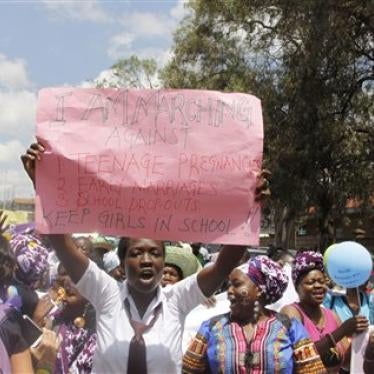(Kampala) – Uganda should quickly adopt and put into effect a new law to protect everyone from violence and harassment, including sexual harassment, at work, Human Rights Watch said today. In a positive move, Uganda formally ratified the landmark global treaty to end violence and harassment at work on August 7, 2023.
President Yoweri Museveni should now sign into law an amended employment bill that has been pending since May, and Ugandan authorities should promptly work to ensure that all laws, regulations, and policies are in line with the global treaty. The treaty requires countries to adopt laws and regulations against harassment and violence at work, including prevention measures, complaints mechanisms, monitoring, enforcement, and support for survivors.
“After years of hard work by civil society, trade unions and Ugandan officials, Uganda has officially ratified the global treaty to end violence and harassment at work,” said Rothna Begum, senior women’s rights researcher at Human Rights Watch. “President Yoweri Museveni should now quickly approve the employment bill, and Ugandan authorities should prioritize reforms of all laws, policies and regulations to ensure that everyone in the world of work is free of violence and harassment.”
On August 7, Uganda authorities officially notified the International Labor Organization of its ratification of Convention 190 on Violence and Harassment (C190), following the cabinet’s approval on May 8. This makes Uganda the eighth country in the Africa to ratify the treaty and 32nd worldwide. Uganda played a key role as part of the African bloc during the negotiations for the convention and committed to ratifying it when it was adopted in 2019.
On May 24, the Ugandan Parliament passed the Employment (Amendment) bill 2023, which obligates all employers to prevent sexual harassment, and prohibits mistreatment, harassment or violence against any employee. It also extends labor law protections to domestic workers and provides protections for certain casual workers. The bill is now before the president for approval.
Studies have found that violence at work in Uganda is highly prevalent. Uganda’s 2021 national survey on violence against women and girls found that 86 percent of working women reported facing violence at work in the year preceding the survey, with verbal abuse the most frequent form. It also found women in rural areas are twice as likely as women in urban areas to have experienced workplace violence, and recent migrant women are also more likely to have experienced violence.
Another study from 2020 by Akina Mama wa Afrika, a pan-African feminist nongovernmental organization in Kampala, found that sexual harassment is rampant in the floriculture, banking, and urban market sectors, where women workers are predominant.
Over the last four years, trade unions, local women’s rights, and worker rights groups, have raised awareness of C190, advocated for its ratification, and negotiated reforms to align current laws and policies with the treaty. The multi-stakeholder Technical Working Group on ending sexual harassment and violence in the world of work, formed in 2022, played a key role in Uganda’s ratification of the treaty and reforms to align with it.
The group, chaired by the minister of gender, labor, and social development, includes representatives from the National Organization for Trade Unions, Federation of Uganda Employers, Akina Mama wa Afrika, Association of Women Lawyers, Platform for Labor Action, among other groups, organizations, and ministries.
“This is a huge win,” said Elizabeth Kemigisha, advocacy officer at the Association of Women Lawyers (FIDA Uganda).“This legally binding instrument has a transformative and bold message that gender-based violence is unacceptable, punishable and will not be tolerated in the world of work. This ratification is important especially for women who work in the informal sector whose workspaces continue to normalize sexual harassment. Now, we urge the Government to implement this Convention.”
The Employment (Amendment) Bill 2023, passed by Parliament on May 24, 2023, amends the Employment Act No. 6 of 2006. The president needs to approve the bill before regulations and policies can be drafted to carry out the new provisions. The bill is a reconciled merger of a bill introduced by Betty Amongi Akena, the gender, labor, and development minister, and a private members bill introduced by Agnes Kunihira, a Workers’ Representative member of parliament.
The Bill amends Section 7(4) of the Employment Act 2006 by requiring all employers to put measures in place to prevent sexual harassment irrespective of the number of employees at the workplace. Currently, the law only imposes such obligations on employers with over 25 employees.
The bill also prohibits mistreatment, harassment or violence against an employee including intimidation, and physical, verbal or written abuse that interferes with work or creates an intimidating, hostile or offensive environment. However, it does not fully align with the treaty, which defines “violence and harassment” in the world of work as “a range of unacceptable behaviors and practices, or threats thereof, whether a single occurrence or repeated, that aim at, result in, or are likely to result in physical, psychological, sexual or economic harm, and includes gender-based violence and harassment.”
The bill for the first time explicitly recognizes domestic workers as workers under the labor law, and provides that casual workers who have worked for six continuous months will be deemed to have a valid contract and thus are automatically entitled to employment protections. It also authorizes the labor minister to pass necessary regulations for domestic workers, casual employees, and other workers deemed in need of special protection.
“The proposed provisions on prevention and prohibition of sexual harassment, mistreatment, harassment or violence against employees in the Employment Amendment Bill that awaits presidential approval is a concrete and tangible step in the right direction by Uganda,” said Bwiite Lydia, program manager at Platform for Labor Action in Uganda. “If assented into law, this will form a basis upon which detailed regulations on violence and harassment in the world of work can be developed which would provide the opportunity to ensure that all the provisions of the C190 are domesticated.”
The bill includes a new definition of the “workplace” to include all places where work is carried out or where workers are found as a consequence of their work. The treaty requires that tackling violence and harassment needs to go beyond the physical workplace to places also linked with or arising out of work, such as during commuting. It also requires covering not just formal employees, but also people working irrespective of their contractual status, trainees including interns and apprentices, workers whose employment has been terminated, job seekers, and job applicants.
Once the president approves the bill, the authorities should review and update Uganda’s 2012 Employment (Sexual Harassment) Regulations in line with the treaty and conduct regional level consultations to review all regulations to make them consistent with the treaty’s requirements.
The Labor Ministry should work with worker and women’s rights organizations and the Technical Working Group, to identify sectors, occupations and groups that are most vulnerable to violence and determine effective protection measures and complaints mechanisms, including for informal sector workers, in line with the treaty, Human Rights Watch said. The authorities can look at sector-specific legal reforms such as regulations for domestic workers, as well as for market vendors, following the new 2023 Markets Act.
The authorities should also develop measures to mitigate the effects of domestic violence in the world of work, including with flexible working arrangements and leave for domestic violence survivors, as provided under the treaty and its related recommendation.
“The ratification of C190 is an important step forward for Uganda but it is just the beginning,” Begum said. “Now we need to see Ugandan authorities continue to work with worker rights and women’s rights groups, and employers, to root out violence and harassment at work once and for all.”









